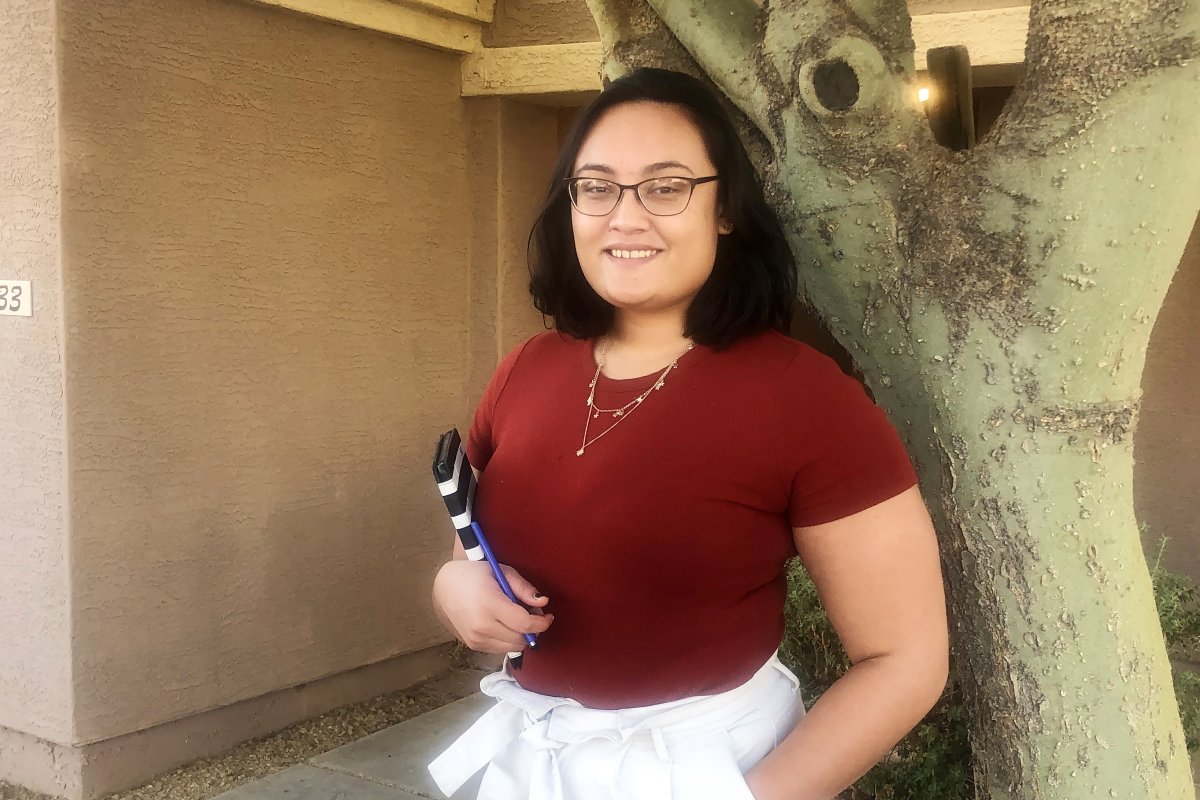Mathematical and emotional support

Above: Rivera, a public school math teacher in Arizona, has had to adjust her expectations and ways of teaching to better meet her students' needs.
Photos courtesy of Azira Rivera.
CSE alumnus teaches and mentors her students via Zoom
December 21, 2020
Even in the best of times, Algebra 2 is hard for many of Azira Rivera’s students. Now, they’re trying to learn about polynomials and quadratic equations in a video Zoom class while balancing family responsibilities.
“One day, one of my students stepped away from the screen. I was like ‘Where did you go?’ And he said ‘Oh sorry. I had to change my nephew’s diaper,’” said Rivera (Math ’17), a public school math teacher outside of Phoenix, Arizona. “My students are caring for their younger siblings, making them lunch, making sure they’re online when they’re supposed to be. I have so much respect for them and everything they are juggling.”
Since the coronavirus hit in mid-March, Rivera has taught her 120 students remotely, with the exception of three weeks in-person this fall until rising COVID-19 cases forced a return online.
Agua Fria High School, where Rivera started teaching four years ago through Teach for America, is two-thirds Latino and more than half the students receive free or reduced-price lunch. Many parents work throughout the pandemic in service and labor jobs. A few families have lost grandparents to COVID-19.
Rivera says during this time of stress, her expectations are different, and her praise flows more freely.
“I want them to know that I support them mathematically and emotionally,” she said.
“I realize we’re in a pandemic and I don’t want my class to be another stressor in their lives,” Rivera added.
Rivera sees herself in her students. She was the first in her family to attend college, ending up at the University of Minnesota almost by chance after an application arrived in the mail. She filled it out and received CSE’s Richard M. Kruger Scholarship.
“I felt like they reached out to me and saw what I was capable of,” she said.
As a first-year student, she lived in the Women in Science and Engineering (WISE) Living Learning Community.
“I met astonishing and brilliant minds,” she said.
“I learned about books to read and shows to watch, and a hundred nerdy things I never would have explored on my own,” Rivera said.
She initially intended to study chemical engineering, but ended up pursuing math with a focus in physiology and a minor in neuroscience. Although she said at times she felt like “an imposter,” she was supported by programs designed for first-generation students.
The North Star STEM Alliance connected her to Yaniv Brandvain, a University of Minnesota associate professor of plant and microbial biology, which led to Rivera presenting a paper about plant genetic mutations in Washington, D.C.
“It was my first experience with academic research, which is something I want to pursue,” she said.
“But I don’t think I could have had the courage to even say that without North Star STEM,” Rivera added.
She also was able to study abroad in Guam, where her father is from, and received academic support from the TRIO McNair Scholars Program. All those experiences created a driving force for her to become a teacher, she said.
Rivera thought she’d teach accelerated math, but she was assigned to co-teach in special education classes.
“I realized this is the population I wanted to work with,” she said. “I want to teach kids who have struggled with math, who need the support and who have all those questions that I’m more capable of answering because I know math at a deeper level.”
Rivera is currently pursuing a master’s degree in math.
The pandemic has made some teachers more aware of the burdens faced by lower-income students of color, and she hopes this will lead to more support.
“It doesn’t matter who you are, or what your home looks like on Zoom,” Rivera said, “you still deserve the best education.”
Read more stories from our Winter 2021 college magazine.
By Maja Beckstrom
